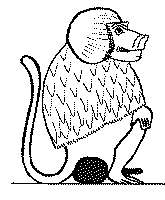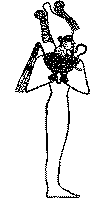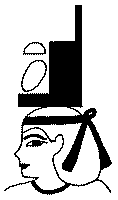Ancient Egyptians and the Constellations: Part 4
The Osiris Legend
The legend of Osiris begins with Thoth, who was credited with having introduced all the arts and sciences, including astronomy and hieroglyphs, to the Ancient Egyptians. He was also the spokesman, or messenger, of the gods and the keeper of their records. "Thoth" is actually the Graeco-Roman form of the Egyptian name "Djehuti". Thoth was usually represented as an ibis bird or a baboon; both of which are native to Africa. This is significant because it reflects his ancient African origin. In addition, because he was regarded as the moon god he was sometimes seen represented together with a winged moon. In legend Thoth had played a game of draughts with the moon and won from him a seventy-second part of his light, from which he created an extra five days in the year. Prior to that time there were 360 days in the Ancient Egyptian Calendar.

Thoth the Moon god ...
it is not difficult to work out
why he was given this role!

Thoth the Keeper of Records
... the product of
sophisticated thinkers.
Osiris was Thoth's master, and in this capacity he was both God and the source of all knowledge in Ancient Egypt. Osiris is frequently pictured with ebony skin, which is usually considered as symbolic of his role as Lord of the Dead. However, when Osiris’ close association with Thoth … who was of ancient African origin … is taken into account, the fact that Osiris had ebony skin takes on a new significance: that he too originated in Africa. His wicked brother Set who wanted the throne of Egypt murdered him. The plan was to induce Osiris to lie down in a magnificent coffer under the pretext of a game at a banquet. Set and his seventy-two conspirators immediately closed the lid and threw the coffer into the Nile.
Osiris' wife Isis, who was also his sister, searched for and found the chest which had been borne down the Nile and across the sea to what was later identified as the Phoenician coast, where it was deposited at the foot of a tamarisk tree. (The reference to Phoenicia was added at a later date to illustrate that the Ancient Egyptian culture was adopted by the Phoenicians, possibly around the 16th century BCE, when Phoenicia was brought under Egyptian control. The Phoenicians are also known by the more familiar title of Canaanites.) As the tree grew it enclosed Osiris and the chest within its trunk ... which was later cut down by the king of Byblos and used as a pillar in his palace. The fragrance of the pillar became renowned far and wide, and when Isis heard about it she immediately understood its significance. Isis returned the pillar, and the body it contained, to Egypt.

Osiris was the source of all knowledge
in Ancient Egypt. The tamarisk tree which
enclosed Osiris within its trunk
was cut downby the King of Byblos
and used as a pillar in his palace.

Isis, the wife of Osiris, was
also his sister. She returned
the pillar, and the body
it contained, to Egypt.
Unfortunately Set discovered the body of Osiris by chance and this time, to ensure his brother's complete demise, he cut up Osiris' body into fourteen pieces and scattered them far and wide throughout Egypt. Isis found all the pieces of Osiris' literally dismembered body except the phallus, and through purification by Thoth, together with magical incantations in which the actual sound of Thoth's voice played a significant part, the resurrection of Osiris and the subsequent fathering of Horus was achieved. Following in the wake of his resurrection Osiris had conferred upon him the title and position of the God of the Dead. In fathering Horus, Osiris embodied the Masculine Creation Principle. In mothering Horus, Isis embodied the Female Creation Principle.
The number seventy-two is significant in terms of astronomy since the sky bodies appear to move through one degree of their cycle over a period of seventy-two years.
It was no coincidence that the original number of days in an Ancient Egyptian year was identical to the number of degrees in a circle; i.e. 360. The Thoth legend encodes the knowledge of Precession by the specific reference to the numbers 360 and 72. When the number 72 is multiplied by the extra 5 days in the year gained by Thoth in the game of draughts with the Moon, the result is 360, the number of degrees in a circle.
Finally, when the seventy-two years are multiplied by the three hundred and sixty degrees of the complete cycle, we discover that it takes is 25,920 years for each heavenly cycle to be completed … at which time the process starts all over again. This cycle is referred to as Precession.
Footnote … subtle references to Freemasonry are intentional.
Copyright Audrey Fletcher 1999
All rights reserved
Adelaide, South Australia




